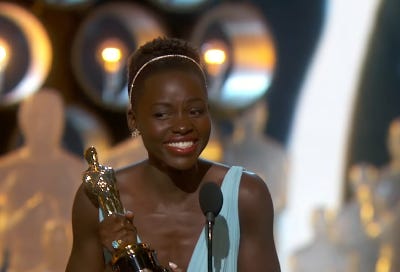Lupita Nyong'o as Patsey in 12 Years a Slave
Best Supporting Actress at the 86th Annual Oscars (2013)
Notable Quote:
“And for that I will be clean.”
Synopsis:
Solomon Northrup (Chiwetel Ejiofor) is a free man who is kidnapped and sold into slavery for, you guessed it, twelve years. During that time, he encounters countless horrors, most of which are inflicted on poor Patsey (Lupita Nyong’o), a victim of her master’s affections, and his wife’s resentment.
The character:
It’s easy to see Patsey as another supporting character in a man’s story, but I actually think that director Steve McQueen adeptly makes her the emotional center of the film, even as she’s not the central focus. Of course, twelve years is an eternity to be enslaved, but ultimately, Solomon has a very specific escape from his situation. It’s Patsey who is representative of the experience of so many enslaved peoples, especially enslaved women. She’s got no education, and no way to even imagine getting out. She will live and die as property, and given how she’s treated over the course of the film, that death will likely come sooner rather than later. Patsey is obedient, hard-working, and productive, and none of that protects her from torture and cruelty, because slavery is unjust to the core.
Patsey is a great character because of the ways that she resists the fact that her body is legally owned by someone else. She’s often docile, and accepts punishment because she has no other choice. But when the opportunity arises, she still seeks dignity and bodily autonomy, at great cost. The most horrendous moment of the film comes when Patsey is whipped after visiting another plantation to get a bar of soap. It’s important that Patsey isn’t seeking food, or water, something that she needs to survive. She’s filthy, and she wants to be able to clean herself, regardless of the cost. Ultimately, if there’s a single image that I’ll leave with from the film, it’s Patsey with a bloody eye, resolutely soldiering on.
The performance:
Lupita Nyong’o’s performance is a fascinating one. She’s not in most of the film, and when she does have screen time, she’s generally sharing it with more bombastic, talkative characters. She speaks very little, and has to convey a lot of her emotions with trembles and quivers. In fact, she’s often called upon specifically to remain stone-faced, even when horribly mistreated, so as to convey that Patsey is specifically just trying to keep her head down.
Of course, it’s the raw misery that Nyong’o has to express that won her the award. It’s absolutely what’s necessary for this performance, and this film: I feel viscerally uncomfortable watching her scream and cry, and that’s how I should feel thinking about slavery. She dives deep into the anguish of the character, and her performance is a huge part of what makes this movie resonate so intensely.
The movie:
12 Years a Slave is a tough movie to talk about. It’s a great film, but I don’t imagine it’s one that I’ll watch again, just because it’s so deeply upsetting. And of course, that’s very intentional, it’s meant to strike against romanticized narratives of the antebellum south. In particular, the movie is great at conveying several really important ideas. It’s a takedown of the idea of the “nice master,” because who cares if someone is interpersonally kind if they own slaves. Michael Fassbender is good at hamming it up as the horrifying master, but one of the most effective parts of the film is watching nice guy Benedict Cumberbatch feebly complain about buying a mother away from her children … and then do it anyway. Another takeaway is just how dehumanizing it is to have your life fully shaped by the stupid whims of whatever idiots have power, whether they want to chuck a glass at you, or make you stay up all night dancing. If you haven’t seen this film, it’s definitely worth a watch – but I also wouldn’t blame you if you can’t go there right now.
Was the Oscar deserved?
Yes, for being willing to put herself emotionally in Patsey’s place.



